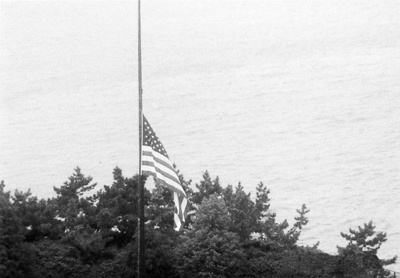All Nonfiction
- Bullying
- Books
- Academic
- Author Interviews
- Celebrity interviews
- College Articles
- College Essays
- Educator of the Year
- Heroes
- Interviews
- Memoir
- Personal Experience
- Sports
- Travel & Culture
All Opinions
- Bullying
- Current Events / Politics
- Discrimination
- Drugs / Alcohol / Smoking
- Entertainment / Celebrities
- Environment
- Love / Relationships
- Movies / Music / TV
- Pop Culture / Trends
- School / College
- Social Issues / Civics
- Spirituality / Religion
- Sports / Hobbies
All Hot Topics
- Bullying
- Community Service
- Environment
- Health
- Letters to the Editor
- Pride & Prejudice
- What Matters
- Back
Summer Guide
- Program Links
- Program Reviews
- Back
College Guide
- College Links
- College Reviews
- College Essays
- College Articles
- Back
The Procession MAG
In English class, my teacher says it needs to happen during the second half of the block. He's afraid they won't dismiss us in time. He's calculated that the two thousand people from our school will fill an entire mile. We wait on edge all class. The announcement doesn't come. Instead it comes as we're milling in the halls on our way to our next classes. The loudspeaker dings. Already quieter than usual, we fall silent. We stand, listening to our principal's directions.
I follow the mass exodus out the front doors. The hockey team pushes past us, leads us onto the road, and splits us into two groups. They wear their jerseys and have ribbons pinned to their chests. Bundles of American flags are passed out. I march alongside a friend. There is noise, but it hardly broaches a whisper.
A half mile down the road we stop. Directions over a megaphone instruct us to move back, to make room for the elementary school. The fourth- and fifth-graders will be arriving. We wait. It's a cold November morning. My friend holds my flag as I tighten my hood. I have a cold, and I wish I had a warmer coat. I hold her flag as she wraps her pink fleece scarf around her head, hijab style.
The kids next to us talk in hushed voices. They aren't comfortable in silence, but it feels wrong to speak. Across the street is a man in a trench coat, his black lab holding a flag in his snout; a family of four, the young children remarkably quiet; a woman with a video camera and black gloves. The loud buzz of a helicopter never goes away. It's hovering, the Channel 5 news team. Yellow ribbons line the streets of our town.
We've been here almost an hour. The wind cuts to the bone, but we can't complain. I'm not fashionable, but I'm fortunate: my boots and jeans are warmer than what the girl next to me wears. Shivering in tights and leather boots, she can't feel her toes. She doesn't complain.
Another announcement. It's coming. A policeman on a motorcycle drives down Concord Road, blue lights flashing. Minutes pass. We look down the road but there's nothing.
It's coming, for real this time. Nothing announces it. As a group we turn to the right and sweep our hoods and hats and scarves off our heads. A tight squadron of police motorcycles passes us with blue lights flashing. Police cars follow from my town and surrounding ones. Next, the stately black SUVs, their passengers inscrutable. The hearse passes, shiny and black. The driver stares straight ahead, emotionless. My right hand covers my heart. The girl next to me copies my gesture. For once I don't mind.
More cars pass in a blur of tinted windows. I see a curly haired girl looking out from a reflective black Lincoln. She looks at me. Her eyes are clear and blue and lined with eyeliner. They're heavy. She's cried today and will again, and she's tired of it. She's exhausted.
More cars. A final police escort. Then the backlog of civilian vehicles caught behind the motorcade. They are more fortunate than those that passed freely in front: driving mile after mile down Concord Road while we waited, they must have felt like intruders, feeling guilty for driving past us.
We put our hoods and hats back on to cover our pink ears. It doesn't matter; they're numb anyway. We hide our cold fingers in pockets and trudge back to school. We're silent. It's the odd one who thinks it's okay to speak. He quiets quickly.
A half mile later, we're back. Teachers stand around with flag-filled arms and I hand mine to my sophomore English teacher; I stare at him for a too-long moment before I recognize him. “Thank you, Shell,” he says. Words stick in my throat.
I'm late to Spanish class, but it doesn't matter; only half the class is there. I slip into a silent room. I sit, staring at my hands. When the room fills, Señora says she can't teach. Her voice cracks. No one speaks for the second consecutive hour.
Leaving, we speak in hushed tones. It feels wrong to speak louder. It feels wrong to exercise what we can do. We didn't complain about the cold because at least we could feel it. We didn't complain about waiting because we could wait. We didn't speak because, suddenly, someone no longer could. We thanked God in whatever silent way we could that we were alive. Because suddenly, one of us wasn't.
Lt. Scott Milley was the first resident of my town to die in combat since the Vietnam War. He was killed after just a month in Afghanistan. While we look forward to college, work, marriage, children, and grandchildren, his life was cut short. He may have been older than us today, but he will remain 23 for the rest of our lives. Thank you, Lt. Milley. Rest in peace.

Similar Articles
JOIN THE DISCUSSION
This article has 0 comments.
